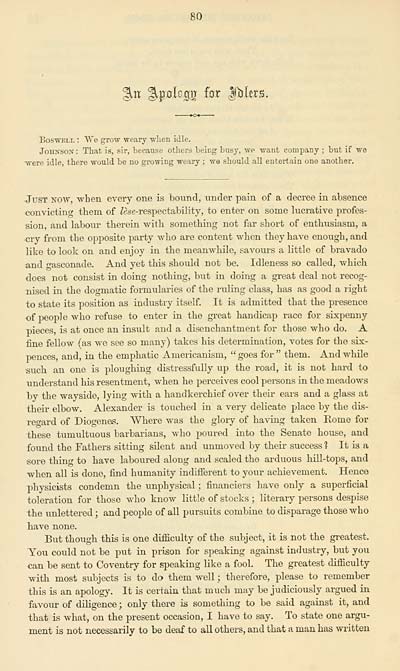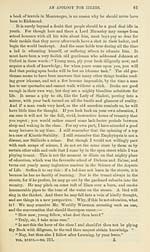Non-Fiction > Uncollected essays > Volumes 33-38, 1876-1878 - Cornhill magazine > Volume 36
(8) Page 80 - Apology for idlers
Download files
Complete book:
Individual page:
Thumbnail gallery: Grid view | List view

80
%n %i^ohQV far |>Ia's.
Bos-n-ELL : "VVe grow weary when idle.
JoiixsoN : That is, sir, because others being busy, we want company ; but if we
-were idle, there would be no growing weary ; we should all entertain one another.
Just now, when every one is bound, under pain of a decree in absence
convicting them of Zese-respectability, to enter on some lucrative profes-
sion, and labour therein with something not far short of enthusiasm, a
cry from the opposite party who are content when they have enough, and
like to look on and enjoy in the meanwhile, savours a little of bravado
and gasconade. And yet this should not be. Idleness so called, which
does not consist in doing nothing, but in doing a great deal not recog-
nised in the dogmatic formularies of the ruling class, has as good a right
to state its position as industry itself It is admitted that the presence
of people who refuse to enter in the great handicap race for sixpenny
pieces, is at once an insult and a disenchantment for those who do. A
fine fellow (as we see so many) takes his determination, votes for the six-
pences, and, in the emphatic Americanism, " goes for " them. And while
such an one is ploughing distressfully up the road, it is not hard to
understand his resentment, when he perceives cool persons in the meadows
by the wayside, lying with a handkerchief over their ears and a glass at
their elbow. Alexander is touched in a very delicate place by the dis-
regard of Diogenes. Where was the glory of having taken Rome for
these tumultuous barbarians, who poured into the Senate house, and
found the Fathers sitting silent and unmoved by their success ? It is a
sore thing to have laboured along and scaled the arduous hill-tops, and
when all is done, find humanity indifierent to your achievement. Hence
physicists condemn the unphysical ; financiers have only a superficial
toleration for those who know little of stocks ; literary persons despise
the unlettered ; and people of all pursuits combine to disparage those who
Lave none.
But though this is one difficulty of the subject, it is not the greatest.
You could not be put in prison for speaking against industry, but you
can be sent to Coventry for speaking like a fool. The greatest difficulty
with most subjects is to do them well ; therefore, please to remember
this is an apology. It is certain that much may be judiciously argued in
favour of diligence ; only there is something to be said against it, and
that is what, on the present occasion, I have to say. To state one argu-
ment is not necessarily to be deaf to all others, and that a man has written
%n %i^ohQV far |>Ia's.
Bos-n-ELL : "VVe grow weary when idle.
JoiixsoN : That is, sir, because others being busy, we want company ; but if we
-were idle, there would be no growing weary ; we should all entertain one another.
Just now, when every one is bound, under pain of a decree in absence
convicting them of Zese-respectability, to enter on some lucrative profes-
sion, and labour therein with something not far short of enthusiasm, a
cry from the opposite party who are content when they have enough, and
like to look on and enjoy in the meanwhile, savours a little of bravado
and gasconade. And yet this should not be. Idleness so called, which
does not consist in doing nothing, but in doing a great deal not recog-
nised in the dogmatic formularies of the ruling class, has as good a right
to state its position as industry itself It is admitted that the presence
of people who refuse to enter in the great handicap race for sixpenny
pieces, is at once an insult and a disenchantment for those who do. A
fine fellow (as we see so many) takes his determination, votes for the six-
pences, and, in the emphatic Americanism, " goes for " them. And while
such an one is ploughing distressfully up the road, it is not hard to
understand his resentment, when he perceives cool persons in the meadows
by the wayside, lying with a handkerchief over their ears and a glass at
their elbow. Alexander is touched in a very delicate place by the dis-
regard of Diogenes. Where was the glory of having taken Rome for
these tumultuous barbarians, who poured into the Senate house, and
found the Fathers sitting silent and unmoved by their success ? It is a
sore thing to have laboured along and scaled the arduous hill-tops, and
when all is done, find humanity indifierent to your achievement. Hence
physicists condemn the unphysical ; financiers have only a superficial
toleration for those who know little of stocks ; literary persons despise
the unlettered ; and people of all pursuits combine to disparage those who
Lave none.
But though this is one difficulty of the subject, it is not the greatest.
You could not be put in prison for speaking against industry, but you
can be sent to Coventry for speaking like a fool. The greatest difficulty
with most subjects is to do them well ; therefore, please to remember
this is an apology. It is certain that much may be judiciously argued in
favour of diligence ; only there is something to be said against it, and
that is what, on the present occasion, I have to say. To state one argu-
ment is not necessarily to be deaf to all others, and that a man has written
Set display mode to: Large image | Transcription
Images and transcriptions on this page, including medium image downloads, may be used under the Creative Commons Attribution 4.0 International Licence unless otherwise stated. ![]()
| Early editions of Robert Louis Stevenson > Non-Fiction > Uncollected essays > Cornhill magazine > Volume 36 > (8) Page 80 - Apology for idlers |
|---|
| Permanent URL | https://digital.nls.uk/78693432 |
|---|---|
| Subject / content: |
Youth Essays Laziness |
|---|---|
| Person / organisation: |
Stevenson, Robert Louis, 1850-1894 [Author] |
| Dates / events: |
1877 [Date/event in text] |
|---|---|
| Subject / content: |
Volumes (documents by form) |
| Person / organisation: |
Stevenson, Robert Louis, 1850-1894 [Contributor] |
| Form / genre: |
Written and printed matter > Periodicals |
|---|---|
| Dates / events: |
1860-1975 [Date published] |
| Places: |
Europe >
United Kingdom >
England >
Greater London >
London
(inhabited place) [Place published] |
| Subject / content: |
Fiction Journals (periodicals) Short stories |
| Person / organisation: |
Smith, Elder, and Co. [Publisher] |
| Description | Essays and reviews from contemporary magazines and journals (some of which are republished in the collections). 'Will o' the Mill', from Volume 37 of the 'Cornhill Magazine', is a short story or fable. |
|---|
| Person / organisation: |
Stevenson, Robert Louis, 1850-1894 [Author] |
|---|



